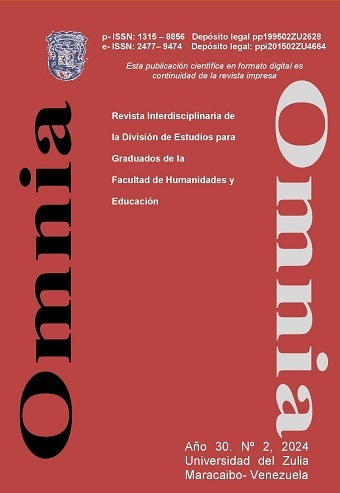Problem-based learning: An andragogical strategy for the formation of critical and reflective Physicians
Abstract
This study aimed to describe and analyze Problem-Based Learning (PBL) as anand ragogical strategy for the formation of critical and reflective physicians. The research was ported by au thorns such as De la Portilla, et al (2019), Pérez, Laura (2018), Morales, et al (2004), among others. The methodology used was a descriptive documentary type, using electronic sources to collect relevant information about the topic. The findings of the research highlight that PBL insane effective e and ragogical strategy for the formation critical and reflective physicians, as it promotes motivation, autonomy, and critical thinking in students by exposing them to real challenges. This allows them to apply and transfer knowledge in practical situations, promoting group discussions and independent in formation search. Additionally, it is emphasized that PBL is compatible with a constructivist vision of learning and focuses on cognitive processes and the active role of the student. I tis concluded that, to improve argumentation and problem-solving skills, I tis essential to promote critical thinking in students. In practical terms, I tis recommended that medical training programs in corporate PBL as a pedagogical strategy to improve the quality of training and prepare future physicians of ace the challenge soft the profession in a critical and reflective manner
Downloads
References
Chávez de la Rosa, Daniela; Tass Rosado, Juan D.; Villarreal Del Valle, Lilia I.; Sandoval Bernal, Silvia y González Mejía, Verónica (2020). Simulación clínica y dimensiones de pensamiento crítico en estudiantes de medicina de una universidad priva-da. Investigación En Educación Médica, 9(36), 70–77.
Coll, César (1988). Significado y sentido en el aprendizaje escolar. Reflexiones en torno al concepto de aprendizaje significati-vo. Infancia y Aprendizaje, 41, 131–142
De la Portilla Maya, Sandra.; Dussan, Carolina; Landínez, Diego y Mon-toya Londoño, Diana (2019). Diferencias en los perfiles de pen-samiento crítico en estudiantes de un programa de medici-na. Latinoamericana de Estudios Educativos, 15(2), 31–50.
Díaz, Víctor (2023). El aprendizaje basado en problemas y su inciden-cia en los procesos de aprendizaje en estudiantes de la UE Juan Verdesoto de Babahoyo. (Tesis). Universidad Técnica de Ba-bahoyo.
Dolmans, Diana H. J. M.; De Grave, Willem; Wolfhagen, Ineke y Vleu-ten, Cees (2005). Problem-based learning: Future challenges for educational practice and research. Medical Education, 39(7), 732–741.
Facione, Peter (2015). Critical thinking: What it is and why it counts. Insight Assessment. Recuperado de https://www.insightassessment.com/article/critical-thinking-what-it-is-and-why-it-counts
Hmelo-Silver, Cindy (2004). Problem-based learning: What and how do students learn? Educational Psychology Review, 16(3), 235–266.
Morales, Pedro y Landa, Verónica (2004). Aprendizaje basado en pro-blemas. Theoria, 13(1), 145–157.
Quituisaca Zhunio, Alicia de las Mercedes (2022). El aprendizaje ba-sado en problemas (ABP), como estrategia metodológica inno-vadora para el aprendizaje del idioma inglés en la Unidad Edu-cativa Hermano Miguel de la Salle de los estudiantes del tercero de bachillerato paralelo “A” durante el periodo lectivo 2020-2021 (Tesis de grado, Universidad Politécnica Salesiana, Ecuador
Pérez, Laura (2018). El aprendizaje basado en problemas como estra-tegia didáctica en educación superior. Voces De La Educación, 3(6), 155-167.
Piaget, Jean William Fritz (1947). La psychologie de l’intelligence [The psychology of intelligence]. París: Armand Colin
Ruiz de Gauna Bahillo, González Moro, V., Morán Barrios, J (2015). Diez claves pedagógicas para promover buenas prácticas en la formación médica basada en competencias en el grado y en la especialización. Educación Médica, 16(1), 34–42.
Valencia Castro, Johanna ; Tapia Vallejo, Sara y Olivares Olivares, Sil-via Lizett. (2019). La simulación clínica como estrategia para el desarrollo del pensamiento crítico en estudiantes de medici-na. Investigación En Educación Médica, 8(29), 13–22





